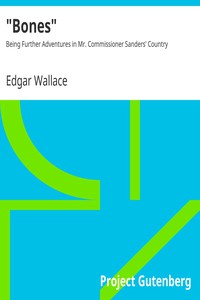The Book of All-Power by Edgar Wallace (learn to read activity book .txt) 📗

- Author: Edgar Wallace
Book online «The Book of All-Power by Edgar Wallace (learn to read activity book .txt) 📗». Author Edgar Wallace
Yet this suave gentleman with his elegant manners and his pretty taste in old china, this genius who was the finest judge in the capital of Pekinese dogs, and had been known to give a thousand-rouble fee to the veterinary surgeon who performed a minor operation on his favourite Borzoi, had another aspect. He who shivered at the first chill winds of winter and wrapped himself in sables whenever he drove abroad after the last days of September, and had sent men and women to the bleakness of Alexandrowski without a qualm; he who had to fortify himself to face an American dentist (his fees for missed appointments would have kept the average middle-class family in comfort for a year), was ruthless in his dealings with the half-crazed men and women who strayed across the frontier which divided conviction from propaganda.
Physical human suffering left him unmoved—he hanged the murderer Palatoff with his own hands. Yet in that operation someone saw him turn very pale and shrink back from his victim. Afterwards the reason was discovered. The condemned man had had the front of his rough shirt fastened with a safety-pin which had worked loose. The point had ripped a little gash in the inexperienced finger of the amateur hangman.
[Pg 60]
He brought Dr. Von Krauss from Berlin, because von Krauss was an authority upon blood infection and spent a week of intense mental agony until he was pronounced out of danger.
He sat before a long mirror in his bedroom, that gave on Horridge's Hotel, and surveyed himself thoughtfully. He was looking at the only man he trusted, for it was not vanity, but a love of agreeable company that explained the passion for mirrors which was the jest of St. Petersburg.
It was his fourth day in London and a little table near the window was covered with patterns of cloth; he had spent an exciting afternoon with the representative of his tailor. But it was not of sartorial magnificence that he was thinking.
He stretched out his legs comfortably towards his reflection, and smiled.
"Yes," he said, as though answering some secret thought, and he and the reflection nodded to one another as though they had reached a complete understanding.
Presently he pushed the bell and his valet appeared.
"Has the Grand Duke gone?" he asked.
"Yes, Excellency," replied the man.
"And the Grand Duchess?"
"Yes, Excellency."
[Pg 61]
"Good!" Serganoff nodded.
"Is your Excellency's headache better?" asked the man.
"Much better," replied the Chief of Police. "Go to their Highness's suite, and tell their servant—what is the man's name?"
"Boolba, Excellency," said the valet.
"Yes, that is the fellow. Ask him to come to me. The Grand Duke mentioned a matter which I forgot to tell Boolba."
Boolba made his appearance, a suave domestic, wearing the inconspicuous livery of an English butler rather than the ornate uniform which accompanied his office in Kieff.
"That will do." Serganoff dismissed his valet. "Boolba, come here."
The man approached him and Serganoff lowered his voice.
"You have made a fool of me again, Boolba."
"Excellency," pleaded the man urgently, "I have done all that was possible."
"You have placed my fortune and my life in the hands of an American criminal. If that is your idea of doing all that is possible, I agree with you," said Serganoff. "Be careful, Boolba! The arm of the Bureau is a very long one, and greater men than you have disappeared from their homes."
"Illustrious Excellency," said the agitated man,[Pg 62] "I swear to you I did all that you requested. There were many reasons why I should not entrust this matter to the men of the secret society."
"I should like to hear a few," said Serganoff, cleaning his nails delicately.
"Excellency, the Grand Duke stands well with the society. He had never oppressed them, and he is the only popular member of the Imperial House with our—their society."
"Our society, eh?" said Serganoff, noticing the slip. "Go on."
"Besides, Excellency," said Boolba, "it was necessary not only to kill the Grand Duke, but to shoot down his assassin. Our plan was to get this American to shoot him in the park, where he walks in the morning, and then for one of the society to shoot the American. That was a good plan, because it meant that the man who could talk would talk no more, and that the comrade who shot down the murderer would stand well with the Government."
Serganoff nodded.
"And your plan has failed," he said, "failed miserably at the outset. You dog!"
He leapt to his feet, his eyes blazing, and Boolba stepped back.
"Highness, wait, wait!" he cried. "I have something else in my mind! I could have helped[Pg 63] Highness better if I had known more. But I could only guess. I had to grope in the dark all the time."
"Do you imagine I am going to take you into my confidence?" asked Serganoff. "What manner of fool am I? Tell me what you have guessed. You may sit down; nobody will come in, and if they do you can be buttoning my boots."
Boolba wiped his damp face with a handkerchief and leaned nearer to the man.
"If the Grand Duke dies, a certain illustrious person succeeds to his estates," he said, "but not to his title."
Serganoff looked at him sharply. The man had put into words the one difficulty which had occupied the mind of the Chief of Police for months.
"Well?" he said.
"The title is in the gift of the Czar," said Boolba. "He alone can create a Grand Duke who succeeds but is not in the direct line. Therefore, the killing of Yaroslav would bring little but the property to the illustrious person. Only if His Imperial Majesty decided upon a worthier holder, or if the Grand Duke fell under a cloud at Court, could it pass to the illustrious person."
"That I know," said Serganoff. "Well?"
"Well, Highness, would it not be better if the Grand Duke were disgraced, if he were brought to St. Petersburg to answer certain charges which the[Pg 64] illustrious person formulated? After, the Grand Duke might die—that is a simple matter. Russia would think that he had been put to death by the Court party as a matter of policy. Yaroslav is not in favour at the Court," he added significantly; but Serganoff shook his head.
"He is not sufficiently out of favour yet," he said. "Go on, man, you have something in your mind."
Boolba edged closer.
"Suppose the Grand Duke or the Grand Duchess were involved in some conspiracy against the Imperial House?" he said, speaking rapidly. "Suppose, on evidence which could not be disputed, such as the evidence of the London police, it was proved that either the Grand Duke or his daughter was in league with an anarchist society, or was attending their meetings—does your Excellency see?"
"I see," said Serganoff, "but they do not attend meetings."
Boolba hesitated.
"Yet," he said, speaking slowly, "I would guarantee that I could bring the Grand Duchess Irene to such a meeting, and that I could arrange for the place to be raided whilst she was there."
Serganoff put down his orange stick and eyed the other keenly.
[Pg 65]
"You have brains, Boolba," he said. "Some day I shall bring you to St. Petersburg and place you on my staff—if you do not know too much."
He paced the apartment, his hands clasped behind his back.
"Suppose you get in touch with this American again, bring him to the meeting, unless he's afraid to come, and then boldly suggest to him that he goes to St. Petersburg to make an attempt upon the life of the Czar himself."
"He would reject it," said Boolba, shaking his head.
"What if he did—that doesn't matter," said Serganoff impatiently. "It is sufficient that the suggestion is made. Suppose this man is amongst these infamous fellows when the London police raid and arrest them, and he makes a statement that he was approached to destroy the Imperial life, and the Grand Duchess Irene is arrested at the same time?"
Boolba's eyes brightened.
"That is a wonderful idea, Highness," he said admiringly.
Serganoff continued his pacing, and presently stopped.
"I will arrange the police raid," he said. "I am in communication with Scotland Yard, and it will be better if I am present when the raid is[Pg 66] conducted. It is necessary that I should identify myself with this chapter," he said, "but how will you induce the Grand Duchess to come?"
"Leave that to me, Highness," replied the man, and gave some details of his scheme.
[Pg 67]
CHAPTER V THE RAID ON THE SILVER LIONSophia Kensky was a loyal and faithful adherent to the cause she had espoused, and her report, written in the weird caligraphy of Russia, greatly interested the butler of the Grand Duke Yaroslav. From that report he learned of the visit which the Grand Duchess Irene had paid; learned, too, that she had been escorted to her car by an Englishman, whose name the woman did not know; and was to discover later that the said "Englishman" had been sent out by Israel Kensky on a special mission. That mission was to discover the Silver Lion, a no very difficult task. In point of fact, it was discoverable in a London telephone directory, because the upper part of the premises were used legitimately enough in the proprietor's business as restaurateur.
Malcolm Hay had lunch at the place and saw nothing suspicious in its character. Most of the clientèle were obviously foreign, and not a few were Russian. Pretending to lose his way, he[Pg 68] wandered through the service door, and there made the important discovery that the kitchen was on the top floor, and also that meals were being served somewhere in the basement. This he saw during the few minutes he was allowed to make observations, because there was a service lift which was sent down to the unseen clients below.
He apologized for his intrusion and went out. Officially there was no basement-room, nor, from the restaurant itself, any sign of stairs which led down to an underground chamber. He made a further reconnaissance, and found the back door which Sophia Kensky had described in her hypnotic sleep, and the location of which the old man had endeavoured to convey to his agent.
Malcolm Hay was gifted with many of the qualities which make up the equipment of a good detective. In addition, he had the education and training of an engineer. That the underground room existed, he knew by certain structural evidence, and waited about in the street until he saw three men come out and the door close behind them. After awhile, another two emerged. There was nothing sinister or romantic about the existence of a basement dining-room, or even of a basement club-room.
The character of this club was probably well[Pg 69] known to the police, he thought, and pursued his inquiries to Marlborough Street police station. There he found, as he had expected, that the club was registered and known as "The Foreign Friends of Freedom Club." The officer who supplied him with the information told him that the premises were visited at frequent intervals by a representative of the police, and that nothing of an irregular character had been reported.
"Have you any complaints to make?" asked the official.
"None whatever," smiled Hay. "Only I am writing an article on the foreign clubs of London, and I want to be sure of my facts."
It was the first and most plausible lie that occurred to him, and it answered his purpose. He returned to Kensky with his information, and the old man producing a map of London, he marked the spot with a red cross. All this time Malcolm Hay was busy making preparations for departure. He would have been glad to stay on, so that his leaving London would coincide with the departure of the Grand Duchess, but his sleeper had already been booked, and he had to make a call en route at Vienna.
It was on the occasion of this visit with details of the location and character of the club, that he first saw Sophia Kensky. He thought her pretty[Pg 70] in a bold, heavy way, and she regarded him with insolent indifference. It was one of the few occasions in his life that he





Comments (0)